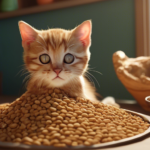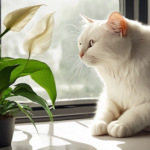Home Remedies for Cat Sneezing and Coughing: Natural Ways to Help Your Feline Friend

Introduction
Cats, just like humans, can experience sneezing and coughing. These symptoms may be indicative of a cat cold, which is a viral infection that affects cats. While these illnesses are not contagious to humans, they can easily spread to other cats. If your feline friend is showing signs of a cold, there are several home remedies you can try to help alleviate their discomfort and promote a speedy recovery. In this article, we will explore natural ways to help your cat when they are sneezing and coughing.
Understanding Cat Colds
A cat cold, also known as feline upper respiratory infection, is a term used to describe a group of symptoms that affect cats. These symptoms are similar to the common cold in humans and are usually caused by viral infections. The most common viruses that cause cat colds are the feline herpesvirus and feline calicivirus.
Symptoms of Cat Colds
Cats with colds may exhibit various symptoms, including:
- Sneezing or coughing
- Watery or runny eyes
- Nasal discharge
- Mild fever
- Lethargy
- Loss of appetite
It’s important to note that while these symptoms are similar to human colds, the viruses and bacteria that cause them in cats are different and cannot be passed between cats and humans.
Contagion and Prevention
Cat colds are highly contagious among cats. If you have multiple cats, it is crucial to isolate the infected cat in a separate room to prevent the spread of the virus. When interacting with the sick cat, remember to change clothes and wash your hands thoroughly before and after to minimize the risk of transmission.
Vaccinations play a vital role in preventing cat colds. Make sure to keep up with your cat’s annual vaccinations, including those against feline herpesvirus and feline calicivirus.
Home Remedies for Cat Sneezing and Coughing
While it’s always recommended to consult with your veterinarian for proper diagnosis and treatment, there are several home remedies you can try to help your cat feel more comfortable and recover from a cold. Here are some natural ways to alleviate cat sneezing and coughing:
1. Steam Therapy
Steam therapy can help relieve nasal congestion and make it easier for your cat to breathe. You can create a steamy environment by bringing your cat into the bathroom while you take a hot shower. The steam will help moisten the airways and reduce congestion. Make sure to supervise your cat during this process to ensure their safety.
2. Humidifier
Using a humidifier in the room where your cat spends most of their time can help increase humidity levels and alleviate dry nasal and throat tissues. Dry air can exacerbate coughing and sneezing, so maintaining proper humidity levels can provide relief for your cat.
3. Clean and Clear the Nose
Keeping your cat’s nose clear of mucus can help them breathe more easily. Gently clean their nose with a damp cloth or a cotton ball soaked in warm water several times a day. This will help remove any discharge and keep the nasal passages clear.
4. Soft and Moist Food
Cats with colds may experience a loss of appetite due to a decreased sense of smell. Offering soft and moist food can make it easier for them to eat and encourage them to regain their strength. You can also moisten their dry kibble with a splash of tuna juice or low-sodium chicken broth to enhance its odor and make it more appealing.
5. Adequate Hydration
It is essential to ensure your cat stays hydrated during a cold. Provide fresh and clean water at all times to encourage them to drink. Cats with colds may be less inclined to drink, so you can try offering water in different bowls or using a pet fountain to make it more enticing.
6. Artificial Tears for Eye Discharge
If your cat has watery or runny eyes, you can use artificial tears to flush their eyes and remove any crusty residue or debris. This will help keep their eyes clean and comfortable. Make sure to choose artificial tears specifically formulated for cats and follow the instructions provided.
7. Extra Comfort and Warmth
Creating a cozy and warm environment can help your cat feel more comfortable while they recover from a cold. Add an extra blanket to their bed or favorite snuggle spots to provide warmth. You can also consider using a heated bed or a low-setting heating pad, ensuring that the heat is not too high to avoid burns.
8. Stress Reduction
Stress can suppress a cat’s immune system, making them more susceptible to infections and illnesses. It is crucial to minimize stress and anxiety during their recovery. Keep their environment calm and quiet, and provide them with their essential needs, such as a litter box, food, water, and a warm bed. You can also use pheromone products designed to reduce stress in cats.
9. Clean Bedding and Environment
To prevent reinfection or the spread of the disease to other cats, it’s important to clean or replace your cat’s bedding daily. Additionally, regularly clean their living environment, including litter boxes, toys, and any surfaces they come into contact with.
10. Veterinary Care
While home remedies can help alleviate symptoms and promote recovery, it’s essential to seek veterinary care if your cat’s condition worsens or does not improve within 4-5 days. Severe symptoms, such as difficulty breathing or extreme lethargy, may require immediate medical attention. Your veterinarian can provide a proper diagnosis and recommend appropriate treatment options.
Conclusion
Cat sneezing and coughing can be signs of a cat cold, which is a viral infection that affects cats. While these illnesses are not contagious to humans, they can easily spread among cats. Using home remedies can help alleviate your cat’s discomfort and promote a speedy recovery. However, it’s important to consult with your veterinarian for proper diagnosis and treatment. By providing a warm and stress-free environment, keeping your cat hydrated, and using natural remedies like steam therapy and humidifiers, you can help your feline friend feel better and get back to their playful self in no time.
Remember, a healthy and happy cat is a cherished companion. Take proactive measures to prevent cat colds by keeping up with vaccinations and maintaining good hygiene practices. With your love and care, your cat will be on the road to recovery in no time.
Disclaimer: The information provided in this article is for educational purposes only and does not constitute veterinary advice. Always consult with a qualified veterinarian for proper diagnosis and treatment of your cat’s condition.






